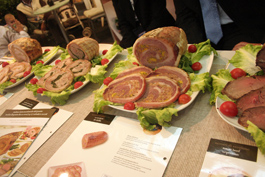home | metro santa cruz index | santa cruz county restaurants | review

Photograph by Ari Levaux
Hog It All: The world's fanciest salamis are on offer at the Salone del Gusto.
Slow Food for the Rest of Us
At the Slow Food movement's Italian bash, a call for social justice
By Ari LeVaux
To people in the Slow Food movement, food is more than caloric gas with which to fill their physiological tanks. Food should be savored, they believe, and the production, preparation and consumption of it is sacred. The movement, which began as a protest against the building of a McDonald's restaurant near the Spanish Steps of Rome in the late 1980s, now counts more than 100,000 members in 132 countries. Its biennial convention, which just ended, consisted of twin events called the Salone del Gusto (Taste Fair) and Terra Madre (Mother Earth).
As I sat in the press room, preparing to enter the fray, Oakland resident Jon Eldan, deputy curator of bread for the Berkeley convivium (as the local chapters are called), sat down at my table. I asked him what was so special about this event.
"There's an incredible depth of regional products to sample and things to learn about. We have so much to learn, principally from the Italians, about what I think is an intrinsic desire to preserve traditions and have great things to eat. The cured meats and cheeses especially show an amazing virtuosity of food craft, of how a single animal can yield such phenomenal product if treated differently.
"So put down that keyboard and go check out the Salone," he urged. He didn't need to tell me twice. It literally took days for me to wander the vast space of the Salone del Gusto, slowed down as I was by the event's 180,000-plus attendees and a bewildering array of artisan food samples from around the world. A few highlights: Wild strawberry jam with rose petals from the high Alps. German garlic flowers marinated in artichoke oil. Tuscan pig-head sausage with lemon and orange. Honey made from chestnut flowers. Transylvanian pickles. Twenty-year-old mead. Twenty-five-year-old balsamic vinegar. An egg from a flock of hens raised on milk from the farm's own dedicated herd of goats--the egg was soft-boiled and served with white truffle shavings. And at every turn: vino, vino, vino.
Thousands of people milling about, stuffing their faces and getting their collective buzz on is a beautiful thing. Which is why I was surprised to hear Slow Food's founder, Carlo Petrini, tell me, "I'm sick of masturbatory gourmets, people who smell a glass of bordeaux for half an hour and speak divinely, as if they are priests, 'Oh, it has the wonderful smell of horse sweat.' No more cooking shows, please; no more stirring pots on television."
His comment embodies an important evolution in the focus of Slow Food. While the movement started virtuously as a response to the ills of fast food, in the States it's been criticized as a sort of elitist supper club for people with the means to indulge in leisurely dinners laced with esoteric musings.
While many Slow Foodies are aware of the environmental, political and social consequences of food production, in many convivia these topics have served more as dinner conversation than rallying cry. But more recently there has begun a focused effort to make social, political and environmental activism part of the Slow Food agenda.
Alice Waters, chef, author and matriarch of the Slow Food movement for decades before it had that name, introduced the new president of Slow Food USA, a farmer named Josh Viertel, who told the group, "The problems in our food system disproportionately hurt poor people and people of color. These are the people who are less able to access the benefits of Slow Food. I'm going to change this organization so that it's not just about pleasure. We are going to become a social justice organization. I want to live in a world where the food is good for the people who eat it, the environment and the people who grow it."
This widening focus is also evident in the structure of the twin events. While the Salone del Gusto maintains the established Slow Food values of top-notch artisan food, Terra Madre gathers thousands of farmers, businesspeople, educators, students and activists for discussions and workshops on sustainable food-production practices.
This year for the first time there was also an emphasis on textiles and music--which played continuously on three stages. Says Carlo Petrini: "Natural fibers and music are part of the farm economy, so they need to be here. Agriculture is not just an economic sector, like steel. It's life. It's rapport with the land. It's social and sacred. This is about identity. That's why we didn't want professional musicians playing so-called 'world music' that's stolen from farmers. We wanted real farmers playing real farm music."
Send a letter to the editor about this story.
|
|
|
|
|
|